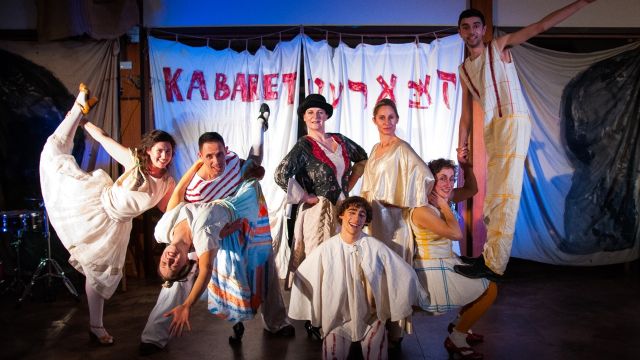A Night to Remember: The Ghetto Cabaret
It’s 1941. A Jewish ghetto somewhere in Eastern Europe. A famous example (there were a thousand ghettos): the Warsaw Ghetto - four hundred thousand Jews packed into three and a half square kilometres. In the face of constant fear of execution, deportation, mistrust of their own Nazi-approved leaders, their Judenrat (Jewish Council), hunger, the stench of bad sanitation disease and simple, straightforward despair, ‘culture’ - art, music, literature and theatre continues – must continue. Kabaret (with a ‘K’ and the ‘t’ is pronounced in this case) was popular - not just as distraction or escapism, but as resistance. A subversive way to say, ‘Life goes on – And we’re still here!’ Galit Klas has made a play out of real ghetto songs, sung here in Yiddish and English, and real black humour ghetto jokes. The songs show every kind of influence: Klezmer, gypsy, jazz and European dance music, demonstrating the cross-currents of European culture from which European Jews were now excluded.
Ms Klas’ play is the cabaret and the cabaret is the play, but the play has already started. In the foyer, performers slip past in overcoats with the yellow star on the breast. As we take our seats, the three-piece band is tuning up. Maria (Tomi Kalinski) is on piano, Henry (Alex Burkoy) plays violin, and Joey (Toby Bender) is on percussion. On stage, Lotte Lichenstein (Elisa Gray), the MC, is anxiously mustering her performers, finding some are late, dealing with the fractious Yankele, the Street Singer (Max Gettler), an orphan kid with his own ideas and who won’t be told; she’s checking her rather snotty dancer Victor (Paul Zaidman) and his partner Clara (Anna Zelleck), and singer-dancer-comedy duo Shimon (Joshua Reuben) and Rivka (Dana Klas). It looks like someone, Bronya, has dropped out… Lotte quells her dread at the possible reason. The show must go on. So, Sheyne Goldstein (Yuliya Mik), the pretty Stage Manager, will have to go on instead, or be dragged on. Sheyne is shy, reluctant, but maybe not that reluctant… And she turns out to sing like an angel! Who knew? And where’s Mrs Rose Hecht (Michelle Gray), the mezzo soprano, the singer who’ll give this show some class? Ah, here she is, elegant, fine-boned, a real lady, but pale, wan, unsteady on her feet. Is it hunger, or the dysentery, or the sudden disappearance of a loved one?
During the show, the under-rehearsed cast (of the cabaret, not the play) will bicker over who’s on next and they’ll object to Yankele’s very bad – and dangerous – jokes; the power will fail and the show will go on in the dark; they will pause at an air-raid siren and pause in a different way at the sound of a departing train… but the show picks up… and continues. Like any good cabaret, there is constant variation: a song, a joke, a dance number, another song. And the songs – many popular songs of the day rewritten by the ghetto Jews to be topical or satirical - are up-beat and comic, or romantic, or they’re tangos, or lullabies, or rebellious anthems, sad but never mawkish.
In the rather make-shift theatre space of the Kadimah, Ms Klas takes us into this ‘night to remember’. Her cast are not all professionals, but they make their characters individuals. Mr Zaidman and Ms Zelleck happen to be professional ballroom dancers – and they are responsible for the choreography, which is very good and quite a feat on the long but shallow stage. Mr Reuben is a beanpole with a sweet grin. Ms Dana Klas looks as if she has stepped out of the period and sings wonderfully as if she is there.
Designer Yvette Coppersmith makes a large and considered contribution with her costumes, deliberately designed and pulled together as they would have been from bits and bobs, tablecloths and pillow cases. The cheerful red stripes on the men’s jerseys are clearly painted on – a touch of defiance in itself - and the sign over the stage – in Yiddish and Hebrew - looks like they ran out of paint.
Here is an evening, then, that is simultaneously entertaining, melancholy and a moving reminder of stubborn resilience. Any one of Ms Klas’s cabaret performer characters could disappear, or die, or just give up tomorrow – but tonight the show must go on.
Michael Brindley
Subscribe to our E-Newsletter, buy our latest print edition or find a Performing Arts book at Book Nook.

